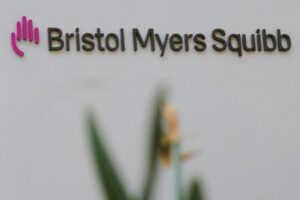(Reuters) – Bristol Myers Squibb won the dismissal on Monday of a $6.4 billion lawsuit claiming it cheated former Celgene shareholders by delaying federal approval for the cancer drug Breyanzi and two other drugs developed by Celgene.
U.S. District Judge Jesse Furman in Manhattan said UMB Bank was never properly appointed trustee for shareholders owning “contingent value rights” (CVR) because its hiring was supported by a majority of beneficial owners, not registered owners.
Furman said that “inexplicable failure” doomed the lawsuit that UMB filed on CVR holders’ behalf in June 2021, a few months after purportedly replacing a different trustee, and 17 months after Bristol Myers bought Celgene for $80.3 billion.
“After three years of litigation and with so much money at stake, the court does not reach that conclusion lightly,” Furman wrote. “UMB has no one to blame for that result but itself.” He said a “properly appointed” trustee can refile the case.
Neither lawyers for UMB nor the Kansas City, Missouri-based bank immediately responded to requests for comment. Bristol Myers and its lawyers did not immediately respond to similar requests.
The merger called for Bristol Myers to pay CVR holders an extra $9 per share in cash if it won U.S. Food and Drug Administration approval of Liso-Cel, which is sold as Breyanzi, and Ozanimod by Dec. 31, 2020, and Ide-cel by March 31, 2021.
CVR holders accused Bristol Myers of being slow to submit critical information to the FDA and to ready plants for inspection, hoping to delay approvals and avoid the $6.4 billion payout.
Bristol Myers won FDA approval for Breyanzi on Feb. 5, 2021, to treat non-Hodgkin’s lymphoma.
CVR holders are appealing Furman’s February dismissal of a separate lawsuit they filed directly, accusing Bristol Myers of securities fraud.
Also in 2024, state court judges in New York and New Jersey dismissed lawsuits by CVR holders who said Bristol Myers’ registration statement for the Celgene merger failed to disclose it had no intention to obtain FDA approval for Breyanzi in time.
The case is UMB Bank NA v Bristol-Myers Squibb Co, U.S. District Court, Southern District of New York, No. 21-04897.
(Reporting by Jonathan Stempel in New York; Editing by Leslie Adler)





